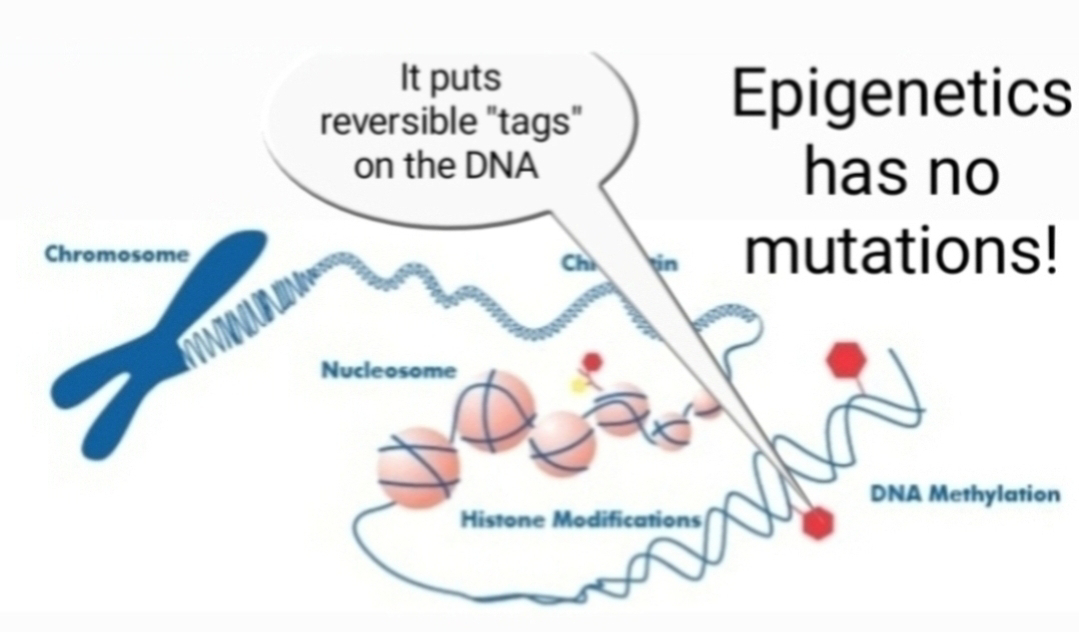Epigenetic Inheritance in Adaptive Evolution
Explanation of the topic explored in the article "Epigenetic Inheritance in Adaptive Evolution" by Sabarís et al. (2023),:
Epigenetic Inheritance: Beyond the DNA Code
Traditionally, Darwinian evolution has been understood through the lens of DNA, the molecule that encodes the blueprint for life. However, recent discoveries challenge this view by introducing the concept of epigenetic inheritance. Epigenetic inheritance refers to the transmission of traits across generations that don't involve alterations in the DNA sequence itself as with Neo-Darwinism. This inheritance mechanism sheds light on how environmental factors can influence organisms and potentially shape their evolutionary trajectory.
Epigenetic Machinery: Regulating Gene Expression
Epigenetic modifications act as chemical tags that attach to DNA or its packaging proteins, histones. These tags influence how genes are expressed, essentially regulating which genes are turned on or off and to what extent. By altering gene expression patterns, epigenetic mechanisms can influence an organism's phenotype, the observable characteristics of an organism.
Epigenetics and Adaptation: A Dynamic Duo
The interplay between epigenetics and adaptation is a fascinating area of evolutionary biology. Epigenetic inheritance can contribute to adaptation in several ways:
Rapid Responses to Environmental Fluctuations: Epigenetic changes can occur much faster than neo darwinian mutations in the DNA sequence. This allows organisms to exhibit phenotypic plasticity, adjusting their traits in response to environmental shifts without necessarily requiring genetic alterations. For instance, plants may adjust their flowering time based on seasonal temperature changes through epigenetic modifications.
Heritability of Acquired Traits: Epigenetic modifications can sometimes persist across generations, potentially leading to the inheritance of traits acquired during an organism's lifetime. This phenomenon, known as transgenerational epigenetic inheritance, is an active area of research with intriguing implications. For example, studies suggest that stressors experienced by an organism might influence the health and development of its offspring through epigenetic mechanisms.
Facilitating Genetic Evolution: Epigenetic inheritance can pave the way for genetic evolution. Epigenetic changes can create a favorable environment for the beneficial epimutations that arise in the DNA. This can accelerate the process of adaptation by allowing organisms to explore different phenotypic variations before genetic mutations become permanently fixed in the population.
The Evolving Landscape of Epigenetic Inheritance
The field of epigenetic inheritance in adaptive evolution is rapidly evolving. Researchers are actively investigating the prevalence and persistence of epigenetic modifications across generations, the environmental cues that trigger these changes, and the long-term evolutionary consequences. This research holds the potential to revolutionize our understanding of how organisms adapt to their environment and how evolution itself unfolds. It compels us to view the evolutionary process as a more intricate interplay between genes, environment, and epigenetic mechanisms.
Unanswered Questions and Future Directions
Epigenetic inheritance in evolution is a relatively new field, and many questions remain unanswered. A key challenge is distinguishing between true transgenerational epigenetic inheritance and confounding factors, such as environmental carry-over effects across generations. Additionally, researchers are seeking to understand the ecological and evolutionary significance of epigenetic inheritance in various populations and environments.
Future research in this area is expected to shed light on the following:
The prevalence and persistence of epigenetic modifications across generations in different species.
The environmental cues or stimuli that trigger transgenerational epigenetic inheritance.
The fitness consequences of epigenetically inherited traits for organisms and populations.
The role of epigenetic inheritance in the process of speciation, the emergence of new species.
By addressing these questions, scientists will gain a deeper understanding of the complex interplay between genes, environment, and epigenetics in shaping evolutionary trajectories.
These modifications can sometimes be passed down to offspring, which challenges the Modern Synthesis of Evolutionary Theory.
The Modern Synthesis, which emerged in the mid-20th century, emphasizes the role of genetics in evolution. It posits that changes in DNA sequence, arising from mutations, are the primary driver of evolution. These mutations are then acted upon by natural selection, leading to the gradual adaptation of populations to their environment.
Epigenetic inheritance introduces a wrinkle into this theory. If epigenetic modifications can be stably inherited, they could provide a mechanism for rapid, environmentally induced adaptation. This is because epigenetic changes can occur more frequently than mutations in the DNA sequence.
For example, an organism might experience a stressful environmental condition that triggers epigenetic modifications, leading to a phenotypic change that enhances survival. If these epigenetic modifications are then passed down to offspring, the offspring will inherit a trait that is better suited to the stressful environment.
This raises several questions about the relative importance of genetics and epigenetics in evolution. It also challenges the idea that natural selection acts primarily on random mutations. Epigenetic inheritance suggests that environmental cues might play a more direct role in shaping the evolution of a species.
The field of epigenetic inheritance is still in its early stages, and there is much that we don't yet understand. However, the potential for epigenetics to influence evolution is significant, and it is an area of active research.





Comments
Post a Comment